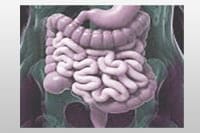 |
IBS - Prosecretory agents Linaclotide and Lubiprostone |
| Linaclotide: Linaclotide is structurally related to human guanylin and uroguanylin and functions as a guanylate cyclase-C (GC-C) agonist. In animal models, linaclotide has been shown to both accelerate GI transit and reduce intestinal pain.9
Findings from the American College of Gastroenterology:3
Findings from the American Gastroenterological Association regarding Antisoasmodics:7
Linaclotide - dosing information:9 Indicated in adults for the treatment of: irritable bowel syndrome with constipation (IBS-C) and chronic idiopathic constipation (CIC). Recommended Dosage: Preparation and Administration Instructions: For adult patients with swallowing difficulties, LINZESS capsules can be opened and administered orally in either applesauce or with water or administered with water via a nasogastric or gastrostomy tube. Sprinkling of LINZESS beads on other soft foods or in other liquids has not been tested. Lubiprostone (Amitiza® ): a locally acting chloride channel activator that enhances a chloride-rich intestinal fluid secretion without altering sodium and potassium concentrations in the serum. Lubiprostone acts by specifically activating ClC-2, which is a normal constituent of the apical membrane of the human intestine, in a protein kinase A-independent fashion. By increasing intestinal fluid secretion, lubiprostone increases motility in the intestine, thereby facilitating the passage of stool and alleviating symptoms associated with chronic idiopathic constipation. 10
Findings from the American College of Gastroenterology:3
Findings from the American Gastroenterological Association regarding Lubiprostone:7
Lubiprostone - dosing information:10 Indications: Dosage: Irritable Bowel Syndrome with Constipation: 8 mcg twice daily. Dosage in patients with hepatic impairment: For patients with severely impaired hepatic function (Child-Pugh Class C), the recommended starting dose is 8 mcg once daily. If this dose is tolerated and an adequate response has not been obtained after an appropriate interval, doses can then be escalated to full dosing with appropriate monitoring of patient response. Dosage adjustment is not required for patients with moderately impaired hepatic function (Child-Pugh Class B). |
References |
IBS – Prosecretory agents Linaclotide and Lubiprostone
Reference(s)
National Institutes of Health, U.S. National Library of Medicine, DailyMed Database.
Provides access to the latest drug monographs submitted to the Food and Drug Administration (FDA). Please review the latest applicable package insert for additional information and possible updates. A local search option of this data can be found here.

